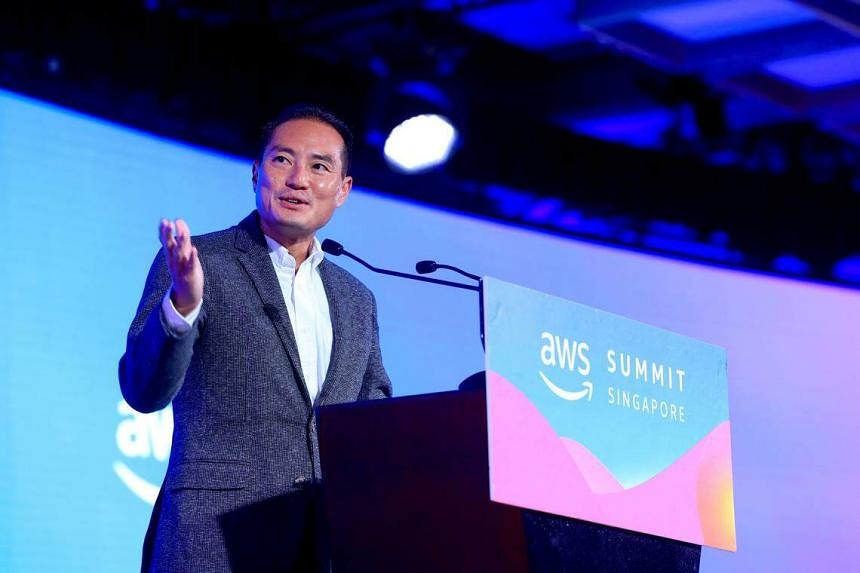SINGAPORE – Amazon Web Services (AWS) is set to make one of the largest investments yet in digital infrastructure in Singapore, with $12 billion over the next four years going into cloud and artificial intelligence (AI) projects, as well as expanding its operations here.
It will also helm a series of workshops with at least 100 enterprises here to help drive AI adoption.
The company announced at the AWS Summit held at Marina Bay Sands on May 7 that the investment brings the company’s total sum poured into Singapore to $23.5 billion.
This is more than double the amount it invested here from 2010, when Amazon’s cloud computing division set up its regional headquarters here for its cluster of data centres, to 2023.
The money will be channelled into expanding AWS’ operations in the Asia-Pacific region, said AWS country manager Priscilla Chong in an exclusive interview with The Straits Times on May 3.
It includes salaries for Amazon staff and costs of importing more specialised equipment and software, construction and data centre operations here, she said.
She did not provide an estimated expense in each area or say whether AWS will hire more people here.
The investment also primes AWS for growing demand for generative AI tools, which require heavy computational power, said Ms Chong.
AWS said in its Singapore economic impact report that the investment is expected to contribute some $23.7 billion to the Republic’s gross domestic product (GDP) and support more than 12,300 jobs through 2028, within AWS and in businesses that use its cloud services.
AWS’ services here supported at least 4,800 full-time roles at local businesses each year between 2010 and 2023, the AWS report found.
Nearly half of these jobs are with AWS’ suppliers, while others are part of the supply chain as a result of its investment here, which came up to $11.5 billion since 2010, generating an estimated $18.3 billion for Singapore’s GDP, AWS reported.
AWS’ services are deeply entrenched in Singapore’s digital services, providing the foundation for thousands of online platforms like Trust Bank, Grab, PayNow, academic institutions and public sector entities.

Market analysts place AWS ahead of the competition in market share, with its estimated worldwide market share above 30 per cent, outpacing the likes of Google and Microsoft.
The investment is one of the largest in AI here, on the back of the Government’s $1 billion investment in AI over the next five years, announced during the 2024 Budget.
AWS’ investment signals a doubling down on aggressive digitalisation in Singapore amid slowing sales globally, as companies cut their spending on cloud services, prompting the firm to cut hundreds of jobs earlier in 2024.
Amazon has reportedly cut more than 27,000 jobs since 2022.
Ms Chong told ST: “There are a few targeted areas where we have seen a need to reprioritise and optimise the resources to where it matters most.
“We don’t take those decisions lightly, and we are working with employees who have been impacted to transition to new roles in Amazon or outside.”
Worldwide public sector country manager Elsie Tan said the company does not provide recruitment figures in Singapore, adding that AWS aims to support Singapore’s mission to triple its pool of AI practitioners to 15,000 within the next five years.
Senior Minister of State for Communications and Information Tan Kiat How said at the AWS Summit that Amazon hires more than 2,000 workers, many of whom are Singaporeans or permanent residents.

Cloud service providers like AWS provide the foundational digital infrastructure for firms to access digital resources like storage, computing power, and advanced capabilities like AI, he added in his opening address.
The digital economy here continues to grow, hitting a compound annual growth rate of 12.9 per cent since 2017, outpacing the rest of the economy, he said, adding that its growth has helped to create jobs. It generated $106 billion in 2022 – or 17 per cent of Singapore’s nominal GDP.
Small and medium-sized enterprises in the region are also predicted to deploy an additional US$130 billion (S$176 billion) to digitalise over the next three years, Mr Tan said.
AI training programme
In collaboration with the Infocomm Media Development Authority (IMDA), AWS also announced a new programme, the AWS AI Spring, which will offer workshops and consulting for organisations in Singapore.
The first four workshops slated over the next two years aim to raise the adoption rate of AI tools and the level of expertise here.
In the next two years, AI Spring will target organisations in six areas, including the public sector, local enterprises, start-ups and research and development.
AWS will provide enterprises with its suite of generative AI tools and expertise, while IMDA will support eligible firms through funding to develop and deploy their AI solutions, such as customer service chatbots and analytical tools.
The initiative adds to the partnerships between the Government and tech companies, like Google with AI Trailblazers, to encourage tech adoption among enterprises here.
AWS’ projects include its work with AI Singapore to build Sea-Lion – a large language model akin to ChatGPT that is trained to understand South-east Asian cultures.
The model is being trained on 11 major regional languages, including Thai, English, Chinese, Malay and Tamil.
AWS is also working with health technology agency Synapxe to help medical providers tap AI across its healthcare systems.
AI Spring also extends to students, with a goal of training 5,000 individuals from universities, polytechnics and the Institute of Technical Education yearly up to 2026 to acquire AI skills.
AWS said it will use its generative AI services to facilitate learning and experimentation with the technology.


